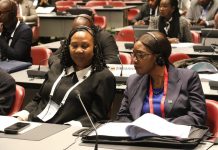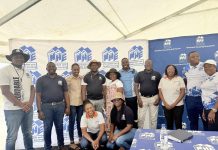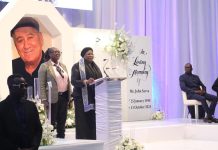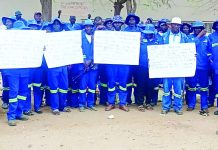Africa-Press – Namibia. Three African cyclists pedalling thousands of kilometres across East and Southern Africa to raise awareness about climate change arrived in Katima Mulilo yesterday morning.
They received a warm welcome from locals and security personnel in the Zambezi region.
The trio – Enock Kitheka (24) from Kenya, Hashu Derrick Kidavasi (30) and Dean Meekson (30) from Zambia – are on a mission they call ‘Cycling for Hope’.
Their goal is to amplify African voices on climate issues and promote sustainable mobility and renewable energy solutions.
They began their journey on 15 September 2025 in Kenya, cycling through Tanzania and Zambia before reaching Namibia, their final African destination.
They will be heading to Brazil for the COP30 Climate Summit in Belém this November.
Warm welcome in Zambezi
The cyclists were received in Katima Mulilo by Zambezi regional police commander Andreas Shilelo.
He commended their commitment to environmental advocacy.
“We are really recommending your action. What you are doing is very important – taking care of the environment and preparing us to do the same. It is something that will put Africa on another level,” said Shilelo.
He said that the regional governor was attending a workshop, but the police and environmental officials had been delegated to officially receive the cyclists.
Riding for awareness
Speaking at the welcome ceremony, Enock Kitheka, the youngest of the trio, said the team is not cycling to break records but to connect with communities and share environmental messages.
“We are not machines,” he said with a smile.
“This is not a championship. We cycle about 100 kilometres a day, engaging with communities, learning from them, and sharing our own experiences. It’s about understanding what people eat, how they live and how climate change affects them,” he added.
The group carries minimal supplies, choosing instead to rely on the generosity and hospitality of the communities they meet.
“We love to eat with the people, to share their food and culture,” Kitheka added.
“That’s how we learn – through real interaction,” he said.
African voices
For Hashu Derrick Kidavasi, the journey is about ensuring Africa’s grassroots voices are heard at global platforms like COP30.
“Most of the time, the voices of Africans – especially from villages – are not heard,” Kidavasi said.
“We are cycling to amplify those voices and to show that solutions to climate change can come from local communities too,” he said.
Kidavasi emphasised that starting the journey in Kenya made sense, since his teammates hail from Kenya and Zambia.
He hopes the initiative grows to include cyclists from all 54 African nations by the 2031 COP summit.
Zambian cyclist Dean Meekson said they depend heavily on local knowledge for safe passage through remote and wildlife-rich areas.
“We rely on community guidance,” he stated.
“They tell us which routes are safe and when it’s best to travel. So far, we’ve done more than 3 200 kilometres,” he added.
Meekson said that Kenya was chosen as a starting point because of its role as a regional hub for clean energy innovation.
“We want to show that Africa doesn’t need to import solutions for climate problems,” he said.
“We can create local answers that work globally,” he added.
Guidance
Leeverty Muyoba, Control Warden for the Zambezi region, briefed the cyclists about the challenges ahead, particularly as their route passes through the Bwabwata National Park.
“The park is unique because communities live alongside wildlife,” Muyoba said.
“The first 40 kilometres from Kongola is a core wildlife area. We’ll ensure they’re escorted in that stretch for safety due to wild animals,” he added.
From Katima Mulilo, the cyclists will head to Windhoek, where they plan to rest and prepare for their flight to Brazil.
They aim to arrive in Belém by early November, just in time for COP30, where they will present a declaration summarising their journey’s findings and community experiences.
Their story – one of endurance, unity and environmental advocacy – embodies a growing movement of young Africans taking climate action into their own hands.
“By the time we finish, we’ll have a declaration that reflects the voice of Africa – the voice from the road, from the people, and from the land itself,” Kitheka said.
For More News And Analysis About Namibia Follow Africa-Press






